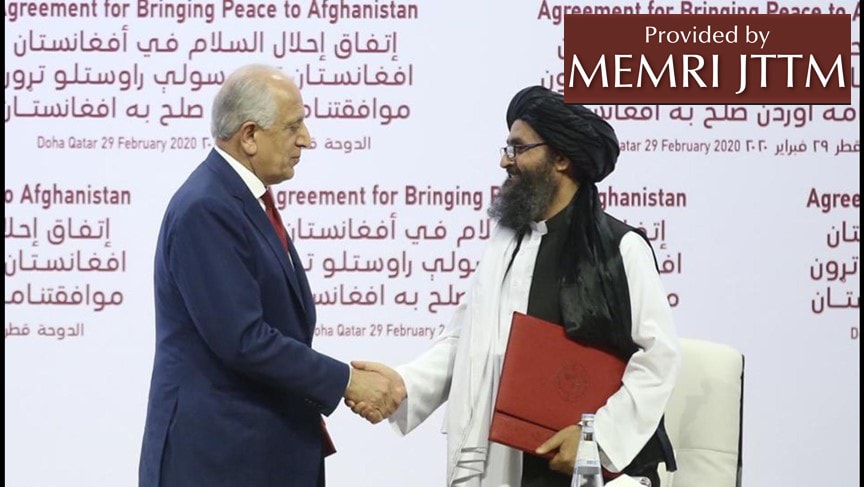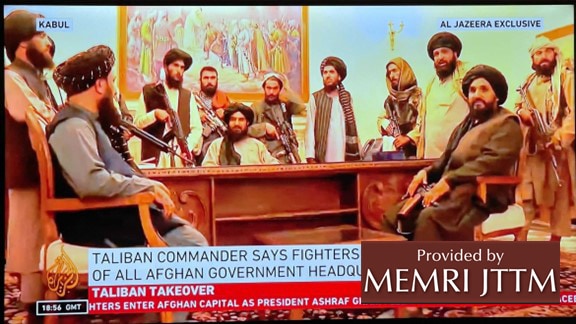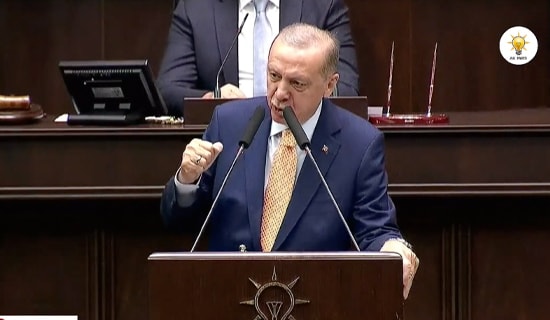In early August 2022, an article in a Pakistani daily and an editorial in Afghan media examined the U.S.'s policy on Afghanistan, especially discussing America's strategic objectives in the region vis-à-vis Russia, China, Iran, and Pakistan. The basic thrust of the two articles is that the U.S.'s continued engagement with the Islamic Emirate of Afghanistan (the Taliban jihadi organization that seized power on August 15, 2021) is Washington's strategic necessity to further its strategic objectives in the South and Central Asian region.

The article, titled "Emerging U.S.-Taliban Collaboration And Pakistan," was written by Dr. Muhammad Khan, a professor of politics and international relations at International Islamic University, Islamabad.[1] In his article, Dr. Khan identified five objectives that the U.S. is pursuing in the region by remaining engaged with the ruling Taliban jihadi organization. These objectives include: checking the rise of Russian and China, keep a watch on Iran and its role in the Middle East; pressuring Pakistan to downgrade its relationship with Beijing; and maintaining influence in Central Asia by curtailing the Russian and Chinese influence there.
The second is an editorial, titled "United States' Strategy and Zawahri's Dead" and published by Hasht-e-Subh, an Afghan daily, a few days after Al-Qaeda leader Ayman Al-Zawahiri was killed in a U.S. drone strike on July 31, 2022.
The editorial examines two sides of the debate: one group of analysts seeing Zawahiri's killing as an American warning to the Afghan Taliban to get in line and cooperate, and the second group of observers who view Zawahiri's killing as a result of the emerging U.S.-Taliban alliance that is designed to facilitate the recognition of the Islamic Emirate's government.
"On June 30, 2022, United States And Interim Taliban Government Of Afghanistan Agreed To Collaborate And Cooperate With Each Other"
Following are excerpts from Dr. Khan's article:
"On June 30, 2022, the United States and Interim Taliban Government of Afghanistan agreed to collaborate and cooperate with each other during two days [of] meeting at Doha, Qatar. This meeting is considered to be very significant from two perspectives: One, the U.S. delegation under Special Representative for Afghanistan, Thomas West, hinted optimism and re-engagement with Taliban.
"In fact, prior to this meeting, the U.S. State Department signalled revival of diplomatic engagement with the Taliban Interim Government, arguing that Washington cannot achieve its strategic objectives by isolating Kabul. 'We are advancing these interests through engagement. We cannot achieve our objectives with a policy of pure isolation.'
"Two, Taliban Foreign Minister [Amir Khan] showed willingness to reciprocate and extend cooperative hand toward U.S. As per [Taliban spokesman Abdul Qahar] Balkhi, 'FM Muttaqi expressed gratitude to the U.S. for announcing $55 million in humanitarian aid to earthquake victims, reiterating release of Afghan assets and lifting of sanctions.'
"Both sides were found with new spirit of dynamism for reengaging each other. These statements clearly indicate the future course of action in the bilateral relationship of the United States and Interim Taliban Government of Afghanistan.
"Both sides are willing to move forward for the pursuance of their respective goals. By all means, the Taliban government would like U.S. assistance to sustain its poor economy and tracking the U.S. to release $7 billion [assets] of Afghanistan, still frozen by U.S.
"If released, this would be a great boost for the economic revival of Afghanistan. The U.S. side has its strategic objectives in and around Afghanistan, which necessitate Washington to stay closely associated with the Taliban through its strategy of carrot and stick. Whereas U.S. is unwilling to release the frozen $7 billion... [it's] keeping the hope alive by giving economic assistance like $55 million as a humanitarian assistance for earthquake-affected people."
"On One Hand U.S. Is Pursuing A Policy Of Re-engagement With Interim Taliban Government; On The Other, It Has Clarified That, 'None Of These Engagements Should Been As "Legitimizing" The Taliban"
"On one hand U.S. is pursuing a policy of re-engagement with the Interim Taliban Government; on the other, it has clarified that, 'None of these engagements should be seen as "legitimizing" the Taliban or its so-called government but ... [as] a mere reflection of the reality that we need to have such discussions in order to advance U.S. interests.'
"Indeed, this is an inherited contradiction in the U.S. policy which Washington calls as a flexible approach. Such double-standards were observed in the U.S.-Taliban Agreement for Bringing Peace to Afghanistan, signed on February 29, 2020.

February 29, 2020: U.S. Representative for Afghanistan Reconciliation Zalmay Khalilzad and the Taliban Deputy Leader Mullah Baradar shake hands after signing Doha agreement
"The U.S. government signed this agreement with a Non-State Actor (Taliban) where Taliban projected itself and got it in-writing in agreement as 'The Islamic Emirate of Afghanistan.' This agreement is considered as an official document and a commitment between U.S. and the Taliban for continuation of their cooperation in future.
SUPPORT OUR WORK

"The agreement laid the foundation for pull-out of U.S. and NATO forces from Afghanistan and a peaceful transition of power to the Taliban from an elected government [headed by the then President Ashraf Ghani]...
"Currently, United States is emphasizing [i.e., pressuring the] Interim Taliban Government for protection of human rights, women's rights, and securing the rights of minorities for which NGOs and many UN agencies are already working in Afghanistan. This in fact is a covert strategy of the United States; the real agenda of the Washington is its strategic interests in the region which can be best achieved while being in the region through a policy of engagement."
"[America's Goal Is] To Keep Pressure On Nuclear Pakistan And To Downgrade Pak-China Relationship"; "To Have An Influence In The Central Asian Region, This Entails Two Aspects – Denying Russian And Chinese Influence There"
"Broadly there are five main objectives of the U.S. in this region: One, to have a check on the rising power of China, which U.S. considers as its peer competitor in the international politics.
"While being in Afghanistan, U.S. can conveniently engage China on multiple grounds – strategic, economic and political.
"Two, countering resurgent Russia, where President Putin has been challenging the U.S. supremacy and finally invaded Ukraine in February 2022.
"Three, to have a close monitoring of Iran, its nuclear program, its expanding power in the Middle East, and especially its enmity with the state of Israel.
"Four, to keep pressure on nuclear Pakistan and to downgrade Pak-China relationship.
"Five, to have an influence in the Central Asian region; this entails two aspects – denying Russian and Chinese influence there.
"Indeed, as a superpower the U.S. would always like to counter any effort by rising and resurgent powers."
"Through Superior War Strategy [In Ukraine], U.S And NATO Are Neutralizing Russia Which Could Be An End To The Russian Efforts Of Becoming A Super Power Again"
"Whereas, Russia has been lured in to invade Ukraine where this resurgent power seems hapless after five months of military campaigning, China is behaving cautiously in the regional and global politics.
"Russia miscalculated the military power of Ukraine and slow and gradual military reinforcement by NATO states.
"Although Ukraine has been destroyed by Russia, but Moscow seems to be failing in its military aggression.
"Through superior war strategy, U.S and NATO are neutralizing Russia which could be an end to the Russian efforts of becoming a super power again.
"Due to its ill-timed military invasion in Ukraine, Russia may not be forthcoming to have a dedicated engagement with Afghanistan, leaving the space for U.S.
"Similarly, China is very guarded in making any serious engagement with the Taliban-led Afghan government."
"There Have Been More Problems Than Solutions For Pakistan After Taliban Took Over Power In Afghanistan"
"Iran too is very careful for its relationship with the Interim Taliban Government. There is hard choice for Pakistan for remaining engaged with Interim Taliban Government which is neither very forthcoming toward Islamabad nor able to economically stabilize Afghanistan.
"There have been more problems than solutions for Pakistan after the Taliban took over power in Afghanistan [on August 15, 2021].
"TTP [Tehreek-e-Taliban Pakistan] has been frequently operating against Pakistani security forces all along the Pak-Afghan border since August 2021.
"Besides, there is political instability in Pakistan which is negatively impacting the economy of Pakistan.
"A politically unstable and economically weaker Pakistan suits U.S. for the attainment of its abovementioned strategic objectives. Indeed, Pakistan is envisioned as a linchpin in the U.S. regional strategy for South and Central Asia.
"It is therefore vital for Pakistani leadership to sit together and debate the challenges through a strategic vision where sovereignty and integrity of the state is ensured while safeguarding its economic and strategic interests regionally and globally."
"[A Group Of Analysts Thinks Zawahiri's Killing Is] The Beginning Of A Process Of Cooperation Between This [Taliban] Group And The United States Is To Build Trust So That The Ground For The Recognition Of The Taliban Government Is Enabled"
Following are excerpts from the editorial in Hasht-e-Subh:[2]
"After the killing of Zawahiri, the debates on America's role in Afghanistan have heated up as the headlines of the news and [television] talks once again. This event has pitted two theories against each other: firstly, an optimistic theory that says that the United States' patience with the Taliban has ended and that the country's strategy has changed to overthrow this group.
And secondly, a theory that says that this attack was carried out in coordination with the Taliban. And the beginning of a process of cooperation between this group and the United States is to build trust so that the ground for the recognition of the Taliban government is enabled to let Afghanistan suffer under the control of a terrorist group for a longer time as long as the group plays effectively its role in favor of the United States.

August 15, 2021: Afghan Taliban mujahideen enter Presidential Palace, Kabul
"Conspiracy theorists believe that the United States, disillusioned with the previous government [under President Ashraf Ghani], decided to replace it with the Taliban in order to put pressure on Iran, Central Asia, and China. According to them, the Taliban's help in killing Ayman Zawahiri was done in this direction. In this way, America's footprints in fielding terrorist groups in this region and the Taliban's alignment with America are hidden, with the help of this [ruling Afghan Taliban] group, a big pit will be dug for America's rivals in the region."
"When External Variables Do Not Allow..., One Can Prepare For The Worst Scenario: An Alliance With The Government Of A Terrorist Group To Achieve Higher Goals, Which Might Not Be Morally Correct"
"Those who view at this attack optimistically, analyze Zawahiri's murder as a sign of a fundamental turnaround in America's policies. They believe that America will never forget 20 years of enmity with the Taliban and Pakistan; and although the continuation of the war will increase the cost of America's presence and then the withdrawal of the forces of that country ended... [yet] the issue of revenge and even the fall of the Taliban has not been ruled out. According to them, the killing of Zawahiri has two messages to the Taliban leaders: that America is aware of all your relations and contacts with the terrorist groups and can eliminate anyone from the scene at anytime and anywhere like the same way as [it] did with Zawahiri.
"Despite the existence of objective evidence to confirm each of these two views, it does not seem that analyzing this story in black and white helps to fully understand it. The big countries of the world, especially the United States, are aware of various variables in the field of politics and in most cases put the principle on flexibility and prepare for each one by predicting and analyzing several scenarios. The existence of a democratic, stable government allied with the U.S. in Afghanistan is undoubtedly one of the best scenarios, but when external variables do not allow such an option, one can prepare for the worst scenario: an alliance with the government of a terrorist group to achieve higher goals, which might not be morally correct, but as long as it is aligned with the pragmatism common in today's world politics and is economical gain, it is ok to implement the project.
"If we consider the recent developments in terms of separating tactics and strategy, we can see the case in this way: the Taliban had promised America that they would fully cooperate with this country, but due to distrust, they allowed the activities of international terrorist groups to put pressure on America and other countries. America's strategy is to make the Taliban its committed ally, but it is unhappy with the continued friendship of this group with China, Russia and Iran. The killing of Zawahiri can remind this group of the Taliban's vulnerability and be a pressure to end their honeymoon with America's rivals.
"Another scenario could also be involved: if the Taliban do not reconsider their relations with the American rivals [China, Iran, and Russia], the groups opposed to the Taliban can be brought back to the scene; provided that they overcome their harmful dispersions; Dispersion and division that caused their defeat and the victory of the Taliban."




